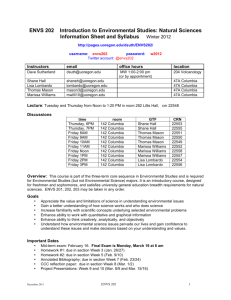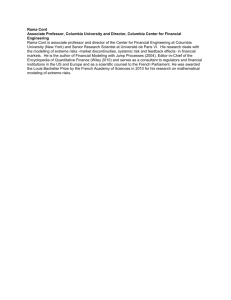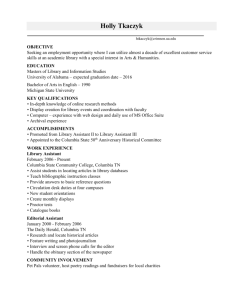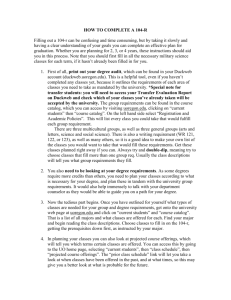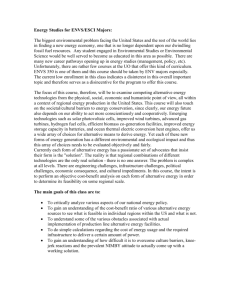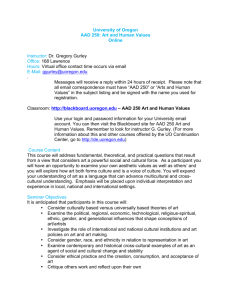ENVS 202 Syllabus 2014 v 1.1 - Environmental Studies Program
advertisement
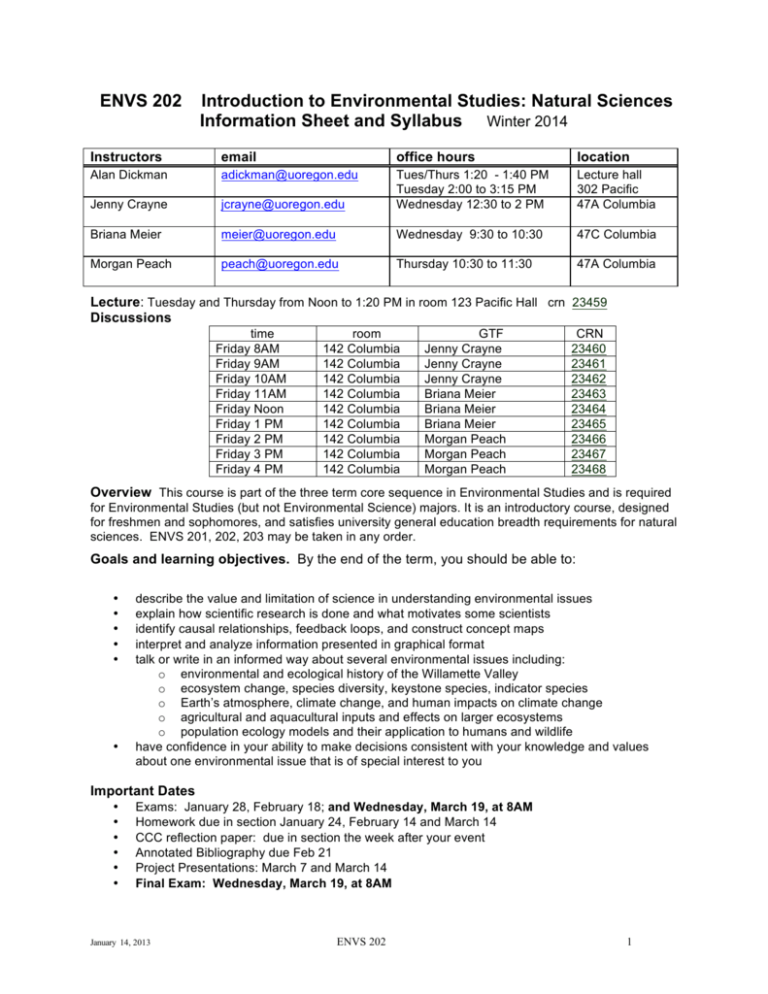
ENVS 202 Introduction to Environmental Studies: Natural Sciences Information Sheet and Syllabus Winter 2014 Instructors email office hours location Alan Dickman adickman@uoregon.edu Jenny Crayne jcrayne@uoregon.edu Tues/Thurs 1:20 - 1:40 PM Tuesday 2:00 to 3:15 PM Wednesday 12:30 to 2 PM Lecture hall 302 Pacific 47A Columbia Briana Meier meier@uoregon.edu Wednesday 9:30 to 10:30 47C Columbia Morgan Peach peach@uoregon.edu Thursday 10:30 to 11:30 47A Columbia Lecture: Tuesday and Thursday from Noon to 1:20 PM in room 123 Pacific Hall crn 23459 Discussions time Friday 8AM Friday 9AM Friday 10AM Friday 11AM Friday Noon Friday 1 PM Friday 2 PM Friday 3 PM Friday 4 PM room 142 Columbia 142 Columbia 142 Columbia 142 Columbia 142 Columbia 142 Columbia 142 Columbia 142 Columbia 142 Columbia GTF Jenny Crayne Jenny Crayne Jenny Crayne Briana Meier Briana Meier Briana Meier Morgan Peach Morgan Peach Morgan Peach CRN 23460 23461 23462 23463 23464 23465 23466 23467 23468 Overview This course is part of the three term core sequence in Environmental Studies and is required for Environmental Studies (but not Environmental Science) majors. It is an introductory course, designed for freshmen and sophomores, and satisfies university general education breadth requirements for natural sciences. ENVS 201, 202, 203 may be taken in any order. Goals and learning objectives. By the end of the term, you should be able to: • • • • • • describe the value and limitation of science in understanding environmental issues explain how scientific research is done and what motivates some scientists identify causal relationships, feedback loops, and construct concept maps interpret and analyze information presented in graphical format talk or write in an informed way about several environmental issues including: o environmental and ecological history of the Willamette Valley o ecosystem change, species diversity, keystone species, indicator species o Earth’s atmosphere, climate change, and human impacts on climate change o agricultural and aquacultural inputs and effects on larger ecosystems o population ecology models and their application to humans and wildlife have confidence in your ability to make decisions consistent with your knowledge and values about one environmental issue that is of special interest to you Important Dates • • • • • • Exams: January 28, February 18; and Wednesday, March 19, at 8AM Homework due in section January 24, February 14 and March 14 CCC reflection paper: due in section the week after your event Annotated Bibliography due Feb 21 Project Presentations: March 7 and March 14 Final Exam: Wednesday, March 19, at 8AM January 14, 2013 ENVS 202 1 Dates Lecture 7-Jan 1. What is Environmental Science? 9-Jan week 1 2. Environmental History of the PNW 14-Jan 3. Evolution and Ecology of Salmon 16-Jan week 2 4. Salmon and Ecosystem Change Assignments/Tests Section Activity Concept mapping, causal maps Issue project brainstorming Form project groups/ Finding and evaluating resources Bring a laptop if possible 21-Jan 5. Ecosystem Health and Restoration Rob Hoshaw Long Tom Watershed Council 23-Jan week 3 6. Introduction to Biodiversity: definitions, measurement, and meaning. Test taking tips. 28-Jan 7. Keystone and Indicator Species; Quiz One (L1-6) Discussion of readings Study tips Homework 1 due in section Quiz One covering Lectures 1-6 Discussion / Debate Invasive species 30-Jan week 4 8. Invasive Species 4-Feb 9. Atmosphere, weather, and climate 6-Feb week 5 10. Climate Change Carbon in the atmosphere Bring a laptop if possible 11-Feb Discussion/Review 13-Feb week 6 11. Climate Research Steve Mital 12. Marine Ecosystems and hypoxic zones Dave Sutherland 18-Feb 13. Midterm (L1-11) 20-Feb week 7 14. Agriculture resources: soil, water, nutrients 25-Feb 15. Fertilizers, pollution, sustainable agriculture 27-Feb week 8 16. Aquaculture 4-Mar 17. Population Ecology models 6-Mar week 9 18. Human Population Ecology Applications Presentations 11-Mar 19. Wildlife Population Ecology Peg Boulay Presentations Homework 2 due in section Midterm covering Lectures 1-11 Annotated Bibliography due in section Field Trip: bioswales Meet with issues project groups Discussion of readings Final touches on presentations Project presentation Session I 13-Mar week 10 Project Presentation Session II 20. Hope and Optimism, review 19 March January 14, 2013 Homework 3 due in section Final Exam 8AM Wednesday ENVS 202 2 Grading Philosophy and Criteria If you get 90% or more of the total possible points, you will receive a grade of A- or higher; if you get 80% or more you will receive a grade of B- or higher; 70% or more ensures a grade of C- or higher. What does this mean for you? I don’t grade you by comparing your work to the others in the class (that is what I think of as grading on a curve.) If you do excellent work, in our judgment, you will get an A, good work earns a B, satisfactory work earns a C. Course grades are based on performance, not on effort, but it is extremely rare that anyone who comes to class regularly, does the reading, and puts a serious effort into studying fails. The number of points needed for a given grade (e.g. the C - cutoff) may be lowered, but will not be raised (this is what students often think of as grading on a curve). Courses applied to the Environmental Studies major and minor must be taken for a letter grade. Course component Quiz Midterm Final Exam Homework Term Project (10% each for bibliography and presentation) CCC project and write-up Participation Total Percent of total grade 8% 20% 25% 12% 20% 5% 10% 100% Classroom Conduct. Please talk to Alan or to your GTF as soon as possible if you have questions about what is expected of you in this class or how you will be graded. We expect everyone to follow University rules and guidelines for behavior. Academic dishonesty, which includes cheating and plagiarism, is a serious offense and will be treated according to the guidelines in the student conduct code (located at uodos.uoregon.edu) This doesn't mean you shouldn't talk with other students about what you are thinking or writing; it does mean that when you write something, it should be in your own words, not copied from someone else. Information about a common form of academic misconduct, plagiarism, is available at http://library.uoregon.edu/guides/plagiarism/students/index.html We ask that everyone do their best to be intellectually honest while also being respectful of personal differences. We welcome and encourage intellectual controversy-- it is essential to real learning. At the same time, we ask that everyone respect the rights of others to hold different opinions, even as we challenge the ideas supporting those opinions. The grade you earn will be a reflection of the quality of work you have done, but not of you as a person. Out of respect for other students, you should plan to arrive at class on time and stay until class is over. If, on occasion, you do arrive late, please be considerate of others and enter in such a way that you don't disturb other students. If you need to leave early, please sit near an exit so that you can leave without disrupting the class. We ask that you not interfere with the ability of other students to learn by making noise when others (instructors or classmates) are speaking or working. Cell phones should not be used in class. Failure to follow these guidelines may lead to a lowered participation score. Crises happen. If you have problems that interfere with your ability to do the work in this class, please let us know promptly. We are willing to make special arrangements when the need is real and when you have done your best to deal with the situation in a timely manner. The University of Oregon Counseling Center, provides students with confidential consultation 24 hours a day, 7 days a week. From 8-5 Monday through Friday you will be connected with the front desk, and after hours, the same number connects to their support line. Their number is 346-3227. Students often believe that their issues are not “severe” enough for them to call, but at the Counseling Center, there is no problem too small. January 14, 2013 ENVS 202 3 Discussion Sections: Discussion sections help you to practice important skills, such as public speaking, respectful and active listening, considering and evaluating other people's viewpoints, and formulating your own viewpoints. Attendance will be taken for the discussion sections and will count towards your participation grade. You must attend the section for which you are registered. Homework and other class assignments will be turned in, discussed, and returned in discussion section. Readings: Assigned readings from current journal articles will be made available in pdf format or weblinks on the Blackboard course website. Participation: Ten percent of your grade is attributed to participation. Attendance and active involvement in sectionals are primary ways to earn participation points. Participation is not simply measured by how vocal you are, however. Other ways to participate include sharing news stories or events with classmates. Missing class (lecture or discussion), arriving late, leaving early, talking, texting, web surfing during class, or otherwise not participating fully will lead to a reduction in your participation grade. A couple of times during the term we will have guest scientists come to talk about their work. These are important parts of the course that cannot easily be made up. Don’t miss these and above all, don’t tune out when a guest comes to talk to us. Homework: Twelve percent of your grade comes from written homework assignments. You can think of these as take-home exams of sorts. It is acceptable to talk to others about the homework, but you must write your own answers. The homework is also intended to help to prepare you to do well on the in-class exams. Homework is due at the start of your discussion section; we will not accept late work. Answers to some homework questions will be posted after the last discussion section meets but before the exam. Exams: Exams will often ask you to apply, synthesize, or evaluate information. This is harder than simply recalling facts. Make-up exams will not be given, so note the dates of the exams carefully and don’t make plans to be out of town on any of those dates. The final exam will be cumulative. Notice that the final exam is scheduled for Wednesday of finals week (at 8AM!) and cannot be taken earlier. Term project: The term project allows you to explore a particular issue in more depth. There are two components to the project: an annotated bibliography done individually, and a presentation to your classmates done in groups of three. A separate handout will describe the project more fully. Classroom Community Connection (CCC): This project is designed to place you in the community to see how one of the topics we are learning about is applied in the real world. You will do a short service project (part of a day) and write a reflection paper about your work and its relation to environmental science concepts. A separate handout will provide details. How to do well in this course: • • • • Attend all class functions (lectures and discussions), arrive on time, stay engaged, turn off electronic devices not related to academic work. Follow policies set by your GTF regarding attendance, participation, office hours, email. Spend several hours each week outside of class studying. Suggested study techniques: • Do the assigned reading in advance or at least skim through the material so that you know what is there and can go back and read in more depth later. • Make use of the course web page and the lecture notes and outlines on it, but do not try to use these as a replacement for attending class. • Ask questions in lecture. Ask questions in discussion. Ask questions in office hours • Get together with someone else in the class at least once a week to study. Keep the big picture in mind by asking yourself how what you are learning relates to current environmental issues Don’t believe everything you hear or read; back up your opinions with credible evidence and logic. January 14, 2013 ENVS 202 4 Other resources and forms of support * Inclusive Access: The University of Oregon works to create inclusive learning environments. If you experience difficulty in this course for any reason, please don’t hesitate to contact Alan. It is especially important that you notify me within the first two weeks of the term if aspects of the instruction or course design present obstacles to your active participation or prevent you from fully demonstrating your abilities. Such obstacles may include, but are not limited to issues concerning physical access and mobility, physical or mental health and well-being, and academic learning. I need to know about such issues so that we can discuss necessary approaches to ensure your full participation and facilitate your learning process. The university offers a wide range of services to support students in their efforts to learn and meet course requirements, including the following: − Accessible Education Center (AEC): The AEC is dedicated to facilitating and supporting accessible education through active collaboration with students, faculty, staff, and the community. The AEC works to create and sustain physical, curricular, and informational environments that are informed by and response to the diverse characteristics and experiences of students with disabilities and variations of ability. Web: http://aec.uoregon.edu/ - Phone: 541-346-1155 − University Counseling and Testing Center (UCTC): The UCTC provides comprehensive mental health care and testing services to the University of Oregon campus. The primary mission of the UCTC is to provide quality clinical/therapeutic services, psychological testing and assessment, psychoeducational workshops, and outreach as well as emergency services. Web: http://counseling.uoregon.edu/dnn/ - Phone: 541-346-3227 − Teaching and Learning Center (TLC): TLC provides numerous resources (including courses, workshop, tutoring, and math and writing labs) to help UO students succeed. They work with a diverse student body with a wide range of needs. If you are unsure which resources would work best, they are happy to answer questions and share suggestions. Web: http://tlc.uoregon.edu/ Phone: 541-346-3226 Diversity: The University of Oregon is dedicated to the principles of equal opportunity in education and an acceptance of diversity as an affirmation of individual identity within a welcoming community. Open inquiry, freedom of expression, and respect for difference are therefore fundamental to a comprehensive and dynamic education. This course is committed to upholding these ideals by encouraging the exploration, engagement, and expression of divergent perspectives and diverse identities. Please do not hesitate to contact me if you feel aspects of the instruction or course design, or classroom activities, undermine these principles in any way. You may also notify the ENVS Program at 541-346-5000. For additional assistance and resources, I encourage you to contact the following campus services, as appropriate for your concerns: − Office of the Vice President for Equity and Inclusion: This Office promotes inclusive excellence by working to ensure equitable access to opportunities, benefits, and resources for all faculty, administrators, students, and community members. Web: http://diversity.uoregon.edu/ - Phone: 541-346-3175 − Bias Response Team (BRT): The BRT works to gather information about bias incidents and to support those who have witnessed, or have become a target, of an act of bias. The BRT provides targets of bias a safe space to have their voices heard, to promote civility and respect, to effect change around these important issues in a quick and effective manner, and to ensure a comprehensive response to bias incidents. Web: http://bias.uoregon.edu - Phone: 541-346-1134 *thanks to Kathy Lynn and Jason Schreiner for producing and sharing the information on this page January 14, 2013 ENVS 202 5
